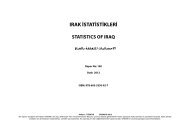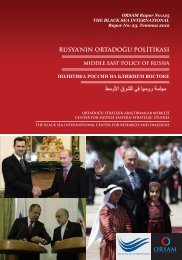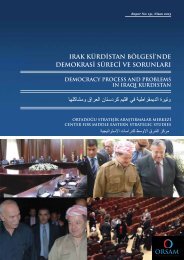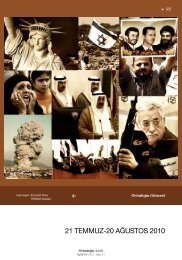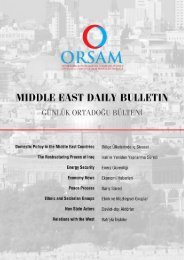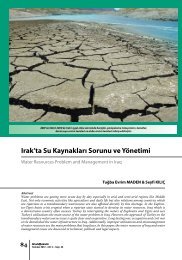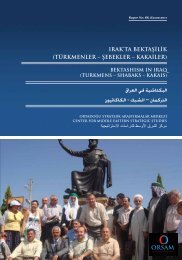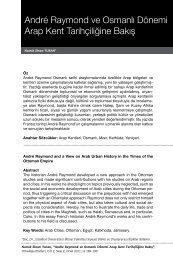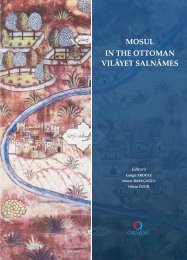turkmen in iraq and their flight - orsam
turkmen in iraq and their flight - orsam
turkmen in iraq and their flight - orsam
You also want an ePaper? Increase the reach of your titles
YUMPU automatically turns print PDFs into web optimized ePapers that Google loves.
TURKMEN IN IRAQ AND THEIR FLIGHT: A DEMOCRAPHIC QUESTION<br />
Figure 12: Preferences of Turkmen <strong>in</strong> Follow<strong>in</strong>g Media<br />
ment. More than 85 per cent of Turkmen have<br />
said they feel they belong to Iraq while the rema<strong>in</strong><strong>in</strong>g<br />
15 per cent said that they belong to<br />
Turkey. Close ties with Turkey <strong>and</strong> common<br />
cultural <strong>and</strong> historic heritage may expla<strong>in</strong> this<br />
choice.<br />
To further iterate the identity issue among migrant<br />
households, another question was asked:<br />
How do you def<strong>in</strong>e yourself? About half of respondents<br />
either left this question blank while<br />
some apparently misunderstood it. Among<br />
those who answered the question, 55 percent<br />
said that they def<strong>in</strong>e themselves as “Turkmen”<br />
whilst another ten percent preferred “Iraqi<br />
Turkmen”, “Iraqi Turkish” or “Turkish” <strong>and</strong> 8<br />
percent of them, all from Kirkuk, called themselves<br />
“Kerkuklu” 82 . Only 24 percent def<strong>in</strong>ed<br />
themselves as “Iraqi” (Figure 13).<br />
Op<strong>in</strong>ions <strong>and</strong> Attitudes Toward Migration<br />
<strong>and</strong> Migration Experiences<br />
Amongst 1040 Turkmen households, 36 percent<br />
was identified as migrant households.<br />
Mostly based on the answers of proxy respondents,<br />
we managed to collect <strong>in</strong>formation about<br />
the experiences <strong>and</strong> characteristics of <strong>in</strong>dividuals<br />
who had ever migrated abroad. Before<br />
the <strong>in</strong>dividual experiences, proxy respondents’<br />
op<strong>in</strong>ions, perceptions about migration <strong>and</strong><br />
about migration experiences of others liv<strong>in</strong>g<br />
around is go<strong>in</strong>g to be exam<strong>in</strong>ed. This is to describe<br />
the overall context <strong>in</strong> which migration has<br />
occurred <strong>in</strong> the past <strong>and</strong> possibly to occur <strong>in</strong><br />
the future.<br />
International migration often occurs when <strong>in</strong>dividuals<br />
are not satisfied with <strong>their</strong> own liv<strong>in</strong>g<br />
conditions therefore it is worth to start with<br />
this: are Turkmen <strong>in</strong> Iraq satisfied with <strong>their</strong><br />
current liv<strong>in</strong>g st<strong>and</strong>ards? Turkmen were asked<br />
to rate <strong>their</strong> level of satisfaction 1 to 10 where<br />
10 means delighted as opposed to 1 reflect<strong>in</strong>g<br />
total dissatisfaction. Despite the majority of<br />
Turkmen have been happy with <strong>their</strong> current<br />
liv<strong>in</strong>g conditions (60%), it is <strong>in</strong>dicated that<br />
Turkmen with members migrated abroad are<br />
www.<strong>orsam</strong>.org.tr<br />
37




